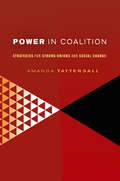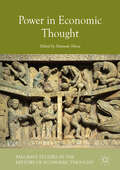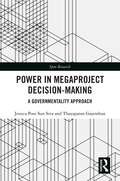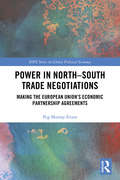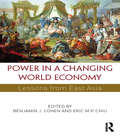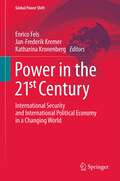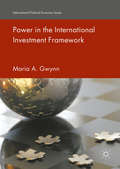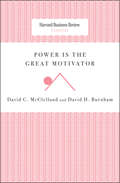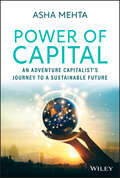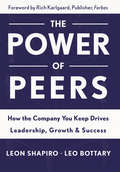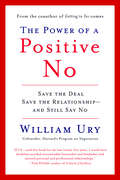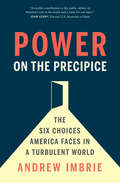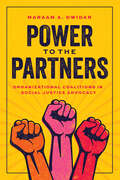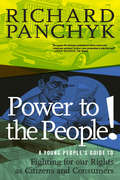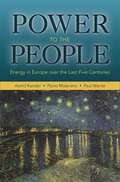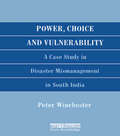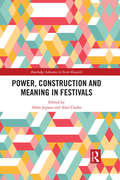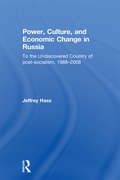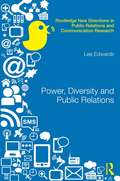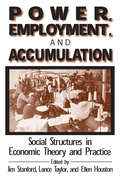- Table View
- List View
Power in Coalition: Strategies for Strong Unions and Social Change
by Amanda TattersallThe labor movement sees coalitions as a key tool for union revitalization and social change, but there is little analysis of what makes them successful or the factors that make them fail. Amanda Tattersall-an organizer and labor scholar-addresses this gap in the first internationally comparative study of coalitions between unions and community organizations. Tattersall argues that coalition success must be measured by two criteria: whether campaigns produce social change and whether they sustain organizational strength over time. The book contributes new, practical frameworks and insights that will help guide union and community organizers across the globe. The book throws down the gauntlet to industrial relations scholars and labor organizers, making a compelling case for unions to build coalitions that wield "power with" community organizations. Tattersall presents three detailed case studies: the public education coalition in Sydney, the Ontario Health Coalition in Toronto, and the living wage campaign run by the Grassroots Collaborative in Chicago. Together they enable Tattersall to explore when and how coalition unionism is the best and most appropriate strategy for social change, organizational development, and union renewal. Power in Coalition presents clear lessons. She suggests that "less is more," because it is often easier to build stronger coalitions with fewer organizations making decisions and sharing resources. The role of the individual, she finds, is traditionally underestimated, even though a coalition's success depends on a leader's ability to broker relationships between organizations while developing the campaign's strategy. The crafting of goals that combine organizational interest and the public interest and take into account electoral politics are crucial elements of coalition success. For more about Power in Coalition, visit the author's wesbite: http://powerincoalition. com.
Power in Economic Thought (Palgrave Studies in the History of Economic Thought)
by Manuela MoscaThis book offers a pluralistic vision of the way economists have dealt with the question of power in society over the last two centuries. Economists’ ideas about power are examined from political, theoretical and policy-making points of view, with additional discussion of the active participation of economists in the management of power.The book is organized into four main conceptions of power relations: i) Power as embedded in political institutions; ii) Power as emerging from the asymmetric relations caused by the unequal distribution of income and wealth; iii) Power as associated to the monopolistic or oligopolistic position held by some firms in the market; and iv) Power as the management of economic policies by the state.Mosca brings together contributions from a range of scholars to analyse how economists have considered the role of power, putting the discussion into a much needed historical context.
Power in Megaproject Decision-making: A Governmentality Approach (ISSN)
by Thayaparan Gajendran Jessica Pooi SivaThis research-based book critically examines the complex interplay of power relations in decision-making in megaprojects. This book is tailored for academics, students, practitioners, clients, and policymakers and addresses a significant gap in understanding how formal and informal power influences decision-making. Through applying governmentality theory and narrative inquiry from thirty-nine interviews, this book presents over sixty-five detailed stories offering a series of real-life narratives that expose the diverse forms of power at play in megaprojects. The stories reveal how deviations from norms can significantly impact project outcomes. This book uncovers the complex web of power relations, institutional norms, and individual actions driving decisions.This book provides a framework illustrating four behavioural contexts, entrepreneurial, box-ticking, deception, and recklessness, as manifestations of megaproject decision-making, providing readers with a tool to understand and navigate the intricate power dynamics in megaprojects.Readers will benefit from practical insights and strategies for fostering conducive decision-making environments, tailoring interventions to promote constructive behaviours, and mitigating harmful actions. This book is a resource for anyone seeking to grasp the complexities of megaproject management in the context of power relations, shaping their decision-making leading to success.
Power in North-South Trade Negotiations: Making the European Union's Economic Partnership Agreements (RIPE Series in Global Political Economy)
by Peg Murray-EvansAdvancing a constructivist conceptual approach, this book explains the surprising outcome of the Economic Partnership Agreements (EPAs) between the European Union and developing countries in Africa, the Caribbean and the Pacific (the ACP countries). Despite the EU’s huge market power, it had limited success with the EPAs; an outcome that confounds materialist narratives equating trade power with market size. Why was the EU unable to fully realise its prospectus for trade and regulatory liberalisation through the EPA negotiations? Emphasising the role of social legitimacy in asymmetrical North–South trade negotiations, Murray-Evans sets the EPAs within the broader context of an institutionally complex global trade regime and stresses the agency of both weak and strong actors in contesting trade rules and practices across multilateral, regional and bilateral negotiating settings. Empirical chapters approach the EPA process from different institutional angles to explain and map the genesis, design, promotion and ultimately limited impact of the EU’s ambitious prospectus for the EPAs. This volume will be particularly relevant to students and scholars of international trade and development and the EU as an international actor, as well as those researching international political economy, African politics and international trade law.
Power in a Changing World Economy: Lessons from East Asia
by Benjamin J. Cohen Eric M. P. ChiuThis book is about power in a changing world economy. Though power is ubiquitous in the study of International Political Economy, the concept is underdeveloped in formal theoretical terms. This collection of essays analyses recent experience in East Asia to advance our theoretic understanding of state power in IPE. Over the last quarter century, no other region of the world has had a greater impact on the global distribution of economic resources and capabilities. China, with its "peaceful rise," now stands as the second largest national economy on the face of the earth; South Korea and Taiwan have become industrial powerhouses; Hong Kong and Singapore are among the world’s most important financial centres; and new poles of growth have emerged in several southeast Asian countries – all while Japan, long the region’s dominant market, has slipped into seemingly irreversible decline. The volume’s nine essays, contributed by leading scholars in the United States, Britain and Taiwan, aim to extract relevant inferences and insights from these developments for the study of state power. All are framed by a core agenda encompassing four key clusters of questions concerning the meaning, sources, uses, and limits of power. These essays ask: What new lessons are offered for power analysis in International Political Economy?
Power in the 21st Century: International Security and International Political Economy in a Changing World
by Jan-Frederik Kremer Enrico Fels Katharina KronenbergThe study of power is the nucleus of political science and international relations. As a shift of power from traditional industrial countries to emerging powers has been perceived since the turn of the century, this book aims to present innovative theoretical and empirical approaches that can increase our understanding of this transition. Scholars from the fields of international relations, international political economy, economics and security studies not only explore current theoretical debates on 'power' and 'power shifts' among entities, but also provide fresh insights into relevant aspects of international power in the 21st century. With a particular focus on aspects of international security, trade and production, new methods of identifying power and its sources are presented, and their potential implications and challenges are discussed.
Power in the International Investment Framework
by Maria A. GwynnThis book offers a unique analysis of bilateral investment treaties (BITs). By developing a new, power-focused paradigm for understanding the international investment framework, the author illustrates why there was no paradoxical behaviour when developing countries agreed to the BIT regime, and what has spurred their reaction against it now. She also examines how attempts to regulate investment at a multilateral level have failed, and why the rules of the framework are evolving. Inspired by the work of Susan Strange, Gwynn fills a significant lacuna in our understanding of these issues by demonstrating how power determines the actions of all those involved. This holistic reinterpretation of international investment focuses in particular on Latin America, but has wider implications for the negotiation of new treaties, including such controversial provisions as the Transatlantic Trade and Investment Partnership. It will appeal to lawyers, economists, political scientists and scholars of Latin America.
Power is the Great Motivator (Harvard Business Review Classics)
by David C. Mcclelland David H. BurnhamIn this exploration into the nature and value of power in organizations, the authors reveal how the drive for influence is essential to good management. They provide a wealth of counterintuitive insights about what using power really means to foster high morale and a strong sense of responsibility in the workplace.
Power of Capital: An Adventure Capitalist's Journey to a Sustainable Future
by Asha MehtaExplore and understand how investment capital is transforming the world&’s most critical emerging markets In Power of Capital: An Adventure Capitalist&’s Journey to a Sustainable Future, distinguished author and Chief Investment Officer at Global Delta Capital, Asha Mehta, shares a simultaneously daring and heartening exploration of rapidly evolving emerging markets. Delivering equal doses of business discussion and geopolitical insight, the author examines the changes gripping the globe and why the average person—and investor—should care. The book provides an on-the-ground perspective informed by the author&’s personal experiences and visits to far-flung regions of the world. It also shares incisive commentary on issues crucial to continuing global economic growth, including terrorism and instability, corruption and autocracy, and sustainable investing. Power of Capital offers: Illuminating insights of China&’s new role as a global economic powerhouse Pioneering perspectives of how sustainable investing delivers both alpha and impact Explorations of how globalization and technology disrupt companies and sectors In-depth discussions of data&’s new and central role as the primary store and creator of value in the modern economy The case for women as the greatest emerging market in the world A page-turning read from a singular and worldly generational leader, Power of Capital: An Adventure Capitalist&’s Journey to a Sustainable Future offers a unique and thought-provoking trip to the globe&’s most fascinating emerging markets.
Power of Peers: How the Company You Keep Drives Leadership, Growth, and Success
by Leo Bottary Leon ShapiroBirds of a feather flock together. We're all in the same boat. Great minds think alike. While just figures of speech to some, they reflect a simple truth--it's the company we keep that often determines the level of personal growth and professional success we achieve in life. Business leaders exchange information and ideas. They network to make deals and build partnerships. They work together to optimize best practices, and they reach out to leaders outside their companies to accelerate growth. Simply put, CEOs and business leaders provide value to one another that they can't find anywhere else. In The Power of Peers, authors Leon Shapiro and Leo Bottary introduce peer advantage, a concept that transcends peer influence. This is what CEOs and business leaders experience when they are more selective, strategic, and structured in the way they engage their peers. Peer advantage gives CEOs the insights to compete and the courage to act. The Power of Peers features stories of business leaders from a range of industries to illustrate the five essential factors for peer advantage, how it impacts personal growth and why it has proven so effective in helping leaders identify future opportunities and challenges. It's what top, growth-oriented executives have relied upon for decades to be successful in business and in life.
Power of Talk: Who Gets Heard and Why
by Deborah TannenMost managerial work happens through talk--discussions, meetings, presentations, negotiations. And it is through talk that managers evaluate others and are themselves judged. Using research carried out in a variety of workplace settings, linguist Deborah Tannen demonstrates how conversational style often overrides what we say, affecting who gets heard, who gets credit, and what gets done. Tannen's linguistic perspective provides managers with insight into why there is so much poor communication. Gender plays an important role. Tannen traces the ways in which women's styles can undermine them in the workplace, making them seem less competent, confident, and self-assured than they are. She analyzes the underlying social dynamic created through talk in common workplace interactions. She argues that a better understanding of linguistic style will make managers better listeners and more effective communicators, allowing them to develop more flexible approaches to a full range of managerial activities.
Power of Unconditional Service Guarantees
by Christopher W.L. HartMost fears about guaranteeing service are groundless. But offering a weak guarantee won't lead to success. The best guarantee is unconditional, meaningful, and easy to understand, invoke, and collect. Properly implemented, a strong guarantee boosts performance; sets clear-cut, customer-defined goals; creates a customer-oriented work force; and generates error data needed for improvement. A strong service guarantee can also boost marketing. It leads to more satisfied customers who generate higher sales and profits. McKinsey Award Winner.
Power of Virtual Integration: An Interview with Dell Computer's Michael Dell
by Joan Magretta Michael DellThis interview offers a deeper look inside Dell's highly publicized success and offers managers a model of how traditional relationships in a value chain can be reconceived in the Information Age. The individual pieces of Dell Computer's strategy--customer focus, supplier partnerships, mass customization, just-in-time manufacturing--may all be familiar. But Michael Dell's business insight about how to combine them is highly innovative: Technology is enabling coordination across company boundaries to achieve new levels of efficiency and productivity, as well as extraordinary returns to investors. In this HBR interview, Michael Dell describes to HBR editor-at-large, Joan Magretta, how his company is achieving "virtual integration" with its customers and suppliers. Direct relationships with customers create valuable information, which in turn allows the company to coordinate its entire value chain back through manufacturing to product design. Dell describes how his company has come to achieve this tight coordination without the "drag effect" of ownership.
Power of a Positive No: How to Say No and Still Get to Yes
by William UryNo is perhaps the most important and certainly the most powerful word in the language. Every day we find ourselves in situations where we need to say No–to people at work, at home, and in our communities–because No is the word we must use to protect ourselves and to stand up for everything and everyone that matters to us. But as we all know, the wrong No can also destroy what we most value by alienating and angering people. That’s why saying No the right way is crucial. The secret to saying No without destroying relationships lies in the art of the Positive No, a proven technique that anyone can learn. This indispensable book gives you a simple three-step method for saying a Positive No. It will show you how to assert and defend your key interests; how to make your No firm and strong; how to resist the other side’s aggression and manipulation; and how to do all this while still getting to Yes. In the end, the Positive No will help you get not just to any Yes but to the right Yes, the one that truly serves your interests. Based on William Ury’s celebrated Harvard University course for managers and professionals,The Power of a Positive Nooffers concrete advice and practical examples for saying No in virtually any situation. Whether you need to say No to your customer or your coworker, your employee or your CEO, your child or your spouse, you will find in this book the secret to saying No clearly, respectfully, and effectively. In today’s world of high stress and limitless choices, the pressure to give in and say Yes grows greater every day, producing overload and overwork, expanding e-mail and eroding ethics. Never has No been more needed. A Positive No has the power to profoundly transform our lives by enabling us to say Yes to what counts–our own needs, values, and priorities. Understood this way, No is the new Yes. And the Positive No may be the most valuable life skill you’ll ever learn! From the Hardcover edition.
Power on the Precipice: The Six Choices America Faces in a Turbulent World
by Andrew ImbrieAn essential guide to renewing American leadership in a turbulent, polarized, and postdominant world Is America fated to decline as a great power? Can it recover? With absorbing insight and fresh perspective, foreign policy expert Andrew Imbrie provides a road map for bolstering American leadership in an era of turbulence abroad and deepening polarization at home. This is a book about choices: the tough policy trade-offs that political leaders need to make to reinvigorate American money, might, and clout. In the conventional telling, the United States is either destined for continued dominance or doomed to irreversible decline. Imbrie argues instead that the United States must adapt to changing global dynamics and compete more wisely. Drawing on the author’s own experience as an adviser to Secretary of State John Kerry, as well as on interviews and comparative studies of the rise and fall of nations, this book offers a sharp look at American statecraft and the United States’ place in the world today.
Power to See Ourselves
by Paul J. BrouwerSelf-image is an important element in a manager's development. Personal growth is a direct result of an individual's changing self-concept. While growth does not occur in clear-cut logical steps, the process involves the following elements: self-examination, which lays the groundwork for insights and changes; the identification of self-expectations; changing to meet those expectations; self-direction; the broadening of perceptions; and self-realization. Growth is the evolvement of personal goals and the sense of venture in pursuing them.
Power to the Partners: Organizational Coalitions in Social Justice Advocacy
by Maraam A. DwidarA vital examination of how social and economic justice organizations overcome resource disadvantages and build political power. Why do some coalitions triumph while others fall short? In Power to the Partners, Maraam A. Dwidar documents the vital role of social and economic justice organizations in American politics and explores the process by which they strategically build partnerships to advance more effective and equitable advocacy. Using original data tracking the collaboration patterns of more than twenty thousand nationally active advocacy organizations, Dwidar evaluates the micro- and macro-level conditions surrounding these groups’ successful efforts to collectively shape public policy. Power to the Partners reveals that while organizational advocates for social and economic justice are at a disadvantage in the American lobbying landscape—financially, tactically, and politically—coalition work can help ameliorate these disparities. By building and sustaining coalitions with structures and memberships that facilitate clarity, learning, and diverse perspectives, these advocates can successfully—and uniquely—make their mark on American public policy. Dwidar’s work offers critical insights for scholars and practitioners alike, from groundbreaking academic findings to evidence-based lessons for political organizers.
Power to the People!: A Young People's Guide to Fighting for Our Rights as Citizens and Consumers (For Young People Series)
by Richard PanchykAn important and empowering history of and guide to the battle for our right to safe products and conditions--for younger readers.Corporations enter our daily lives from the moment we wake up until we turn off the lights at night. Large Internet companies, health insurance companies, fuel and transportation companies--all play a role in our lives every moment of every single day. And yet what power do we have over their actions or intentions? None, except through redress in a court of law for any harm they may have done. This area of the law is known as torts, from the French word for wrongs.Power to the People! offers a deep understanding of how civil actions work, through many examples and straightforward language for the middle-grade student reader. From Ralph Nader's 1966 law-changing address to Congress on automobile safety (it's thanks to Nader that we wear seat belts) to the decades-long battle to raise awareness of the risks of smoking (cigarette and cigar smoke contains over 7,000 chemicals, and has caused the deaths of more than 2.5 million nonsmokers in the last half-century), readers will learn how we must fight to protect ourselves from corporations that are more concerned with profit than our safety. Corporate America will listen, Panchyk argues, but only if we make ourselves heard. Power to the People! explores all the ways we the people can be powerful, too.
Power to the People: Energy in Europe over the Last Five Centuries (The Princeton Economic History of the Western World #46)
by Paul Warde Astrid Kander Paolo MalanimaPower to the People examines the varied but interconnected relationships between energy consumption and economic development in Europe over the last five centuries. It describes how the traditional energy economy of medieval and early modern Europe was marked by stable or falling per capita energy consumption, and how the First Industrial Revolution in the eighteenth century--fueled by coal and steam engines--redrew the economic, social, and geopolitical map of Europe and the world. The Second Industrial Revolution continued this energy expansion and social transformation through the use of oil and electricity, but after 1970 Europe entered a new stage in which energy consumption has stabilized. This book challenges the view that the outsourcing of heavy industry overseas is the cause, arguing that a Third Industrial Revolution driven by new information and communication technologies has played a major stabilizing role. Power to the People offers new perspectives on the challenges posed today by climate change and peak oil, demonstrating that although the path of modern economic development has vastly increased our energy use, it has not been a story of ever-rising and continuous consumption. The book sheds light on the often lengthy and complex changes needed for new energy systems to emerge, the role of energy resources in economic growth, and the importance of energy efficiency in promoting growth and reducing future energy demand.
Power, Choice and Vulnerability: A Case Study in Disaster Mismanagement in South India
by Peter WinchesterNatural disasters make dramatic reading. Every year, some area of the world is devastated by a disaster, with enormous consequent loss of life and disruption to livelihoods. What can be done to alleviate this? Why are such disasters so lethal? Why do people expose themselves to such hazards? Do mitigation programmes help? What effect does aid really have on the areas that receive it? By examining one particular cyclone-prone area of Southern India in great detail over a 10-year period Peter Winchester has come up with some perceptive answers to the questions. In particular, he formulates a set of five 'golden rules' for disaster management. The book will provide valuable and thought-provoking reading for anyone involved with disaster management, and will be essential for all those whose work involves aid or development in disaster-prone areas.
Power, Construction and Meaning in Festivals (Routledge Advances in Event Research Series)
by Alan Clarke Allan JepsonWhether through education, sport or festivity, events form the basis on which we attribute cultural meaning, significance and value to our lives. In this light, community events have the potential to create positive and negative social, cultural, economic and environmental impacts within the community across a wide variety of genres and platforms. This book offers a deeper and more critical insight into the relationships, dynamics and planning processes of festivals and events and the impact this has upon authenticity, cultural consumption and the local communities they serve. It does so by looking at a range of key debates in power theory, event planning and design, event construction, experience and meaning, authenticity, sustainability, social inclusion, accessibility and sponsorship engagement. International case studies are embedded within the chapters, examining the role of stakeholders, local communities, organisers, local governments and infrastructure. This critical event studies text is interdisciplinary and will make valuable reading for students and researchers who are interested in the relationships and dynamics involved in the construction and planning of festivals and events, their immediate impact and their significance for the future.
Power, Culture, and Economic Change in Russia: To the undiscovered country of post-socialism, 1988-2008
by Jeffrey K HassUtilising cutting-edge theory and unique data, this book examines the role of power, culture, and practice in Russia’s story of post-socialist economic change, and provides a framework for addressing general economic change. No other book places power and culture as centrally as this, and in doing so it provides new insights not only into how Russia came to its present state under Putin, but also how economies operate and change generally. In particular, the importance of remaking authority and culture - creating and contesting new categories and narratives of meaning - is shown as central to Russia’s story, and to the story of economies overall. Power, Culture and Economic Change in Russia is an excellent research tool for advanced undergraduate and postgraduate students of sociology, political science, economics, area studies, and other related disciplines.
Power, Dependence, and Effective Management
by John P. KotterIn today's large and complex organizations, the effective performance of most managerial jobs requires one to be skilled at the acquisition and use of power. It is primarily because of the dependence on others inherent in managerial jobs that the dynamics of power necessarily form an important part of a manager's processes. To help cope with dependency relationships, effective managers create, increase, or maintain different types of power over others.
Power, Diversity and Public Relations (Routledge New Directions in PR & Communication Research)
by Lee EdwardsPower, Diversity and Public Relations addresses the lack of diversity in PR by revealing the ways in which power operates within the occupation to construct archetypal practitioner identities, occupational belonging and exclusion. It explores the ways in which the field is normatively constructed through discourse, and examines how the experiences of practitioners whose ethnicity and class differ from the ‘typical’ PR background, shape alternative understandings of the occupation and their place within it. The book applies theoretical perspectives ranging from Bourdieuvian and occupational sociology to postcolonial and critical race theory, to a variety of empirical data from the UK PR industry. Diversity emerges as a product of the dialectics between occupational structures, norms and practitioners’ reactions to those constraints; it follows that improving diversity is best understood as an exercise in democracy, where all practitioner voices are heard, valued, and encompass the potential for change. This insightful text will be essential reading for researchers and students in Public Relations, Communications, Media Studies, Promotional Industries, as well as all scholars interested in the sociology of race and work relations.
Power, Employment and Accumulation: Social Structures in Economic Theory and Policy
by Lance Taylor Brant Houston Jim StanfordThis book provides an interesting and refreshing collection of economic research conducted in the broadly heterodox tradition. A variety of topical issues are addressed, including labor market inequalities, welfare reform, interest rate policies, international trade, and global financial instability. What unites these diverse essays is their common perspective that social institutions and structures "matter" to the performance of economies, and hence should receive more attention from economists. Conventional economic thought focuses unduly on the functioning of so-called "free-markets." The persistent influence of social structures, institutions and practices - and the unequal extent to which differing social constituencies are able to exert power through those structures - often receives short shrift in this traditional research. However, this volume makes a significant contribution by helping to reverse this trend. The chapters, all written by top economists from around North America, address a range of topical issues, utilizing a rich variety of methodological techniques from empirical investigations to game theory and opinion surveys. Furthermore, the book, which is dedicated to the memory of David M. Gordon, has as its unifying theme the incorporation of structural analysis into economic science - an important goal for academics and students alike.
